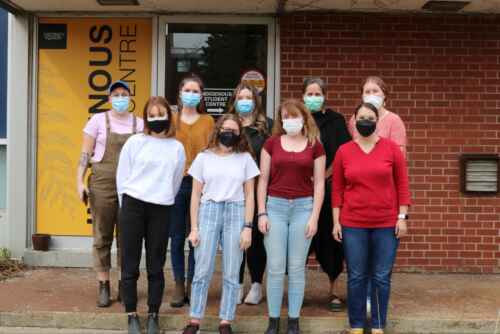A group from the University of Guelph is travelling to Sweden this month for a field school that offers a unique opportunity to engage with the Sámi living in Scandinavia and northern Russia.
Ten U of G Indigenous and non-Indigenous students, faculty and staff will spend the month learning about the Sámi’s land-based practices and how they are working to revive their culture.
In turn, the U of G group will share insight into Indigenous issues in Canada, such as recovering Indigenous identity and culture and bringing Indigenous knowledge into universities.
“Looking at your own context through the context of another can be really enlightening,” said Dr. Kim Anderson, a professor in the Department of Family Relations and Applied Nutrition and one of the U of G leaders making the trip.
“You can start to see the similarities and learn from each other about how we can move forward,” said Anderson, who studies Indigenous family well-being in Canada and Indigenizing U of G’s campus.

Commonalities among Indigenous peoples in Canada and the Sámi include a land-based culture and a history of being colonized by settler states, Anderson said. Learning from one another is the goal of the field school.
Anderson holds the Canada Research Chair in Indigenous Relationships at U of G and studies Indigenous family well-being.
Also attending the field school are Dr. Diana Lewis, a professor in the Department of Geography, Environment and Geomatics, Dr. Cara Wehkamp, assistant vice-president (Indigenous initiatives), and 10 U of G students.
The group will visit Swedish universities involved with research with the Sámi. They will travel to the Sápmi region in northern Sweden to visit the Sámi culture and education centre in Jokkmokk, and will meet reindeer herders.
The field school came about through a partnership with U of G’s Centre for International Programs (CIP), which sought to create an international Indigenous field school, said CIP director Dr. Lynne Mitchell.
“For me, the important part of this program is that it has been developed by Indigenous faculty with Indigenous students in mind,” said Mitchell, adding that CIP hopes to offer a trip with an Indigenous perspective as an ongoing option.
For Wehkamp, the trip will strengthen global Indigenous community connections and support student learning. It provides students with opportunities to grow and make connections between things they have learned in class and their personal interests, she said.
That aspect is partly why Lynn Born, a third-year management, economics and finance student, decided to go.
“I want to learn more about Indigenous cultures, and how I can improve as a person advocating for Indigenous rights,” she said. She added that the trip aligns with her program’s emphasis on corporate social responsibility.
CIP received funding from Global Skills Opportunity (GSO) for the course, which it has used to provide some students with travel grants and to cover support and administrative costs.
GSO is a federal student mobility program that aims to increase the participation of students in international learning opportunities, especially those who have traditionally faced barriers to participation, including students with disabilities, Indigenous students and those from low socio-economic backgrounds.
Contact:
Dr. Kim Anderson
kimberle@uoguelph.ca
Dr. Lynne Mitchell
lmitchel@uoguelph.ca
